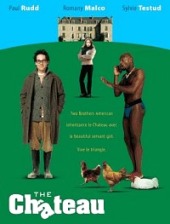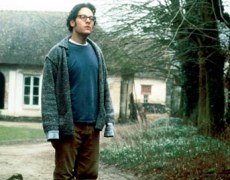|
The Château
|
| |
 |
USA, 2001. Rated R. 91 minutes.
Cast:
Paul Rudd, Romany Malco, Sylvie Testud, Didier Flamand, Maria Verdi, Philippe
Nahon, Donal Logue
Writers: Jesse Peretz, based on an idea by Thomas Bidegain
Music: Patrik Bartosch, Nathan Larson, Nina Persson
Cinematographer: Tom Richmond
Producers: Scott Macaulay, Robin O'Hara
Director: Jesse Peretz
LINKS
|
 t the Los Angeles premiere of The Château, director Jesse Peretz
stated that he had not been sure he could even cut his footage into a feature-length
film. It shows. Though only 91 minutes in length, The Château grows increasingly
tiresome as it milks the same gags too often and becomes overdramatic for a
light comedy while stumbling around for a conclusion.
t the Los Angeles premiere of The Château, director Jesse Peretz
stated that he had not been sure he could even cut his footage into a feature-length
film. It shows. Though only 91 minutes in length, The Château grows increasingly
tiresome as it milks the same gags too often and becomes overdramatic for a
light comedy while stumbling around for a conclusion.
The first thing one notices about The Château is its terrible visual
quality. It is shot on digital video, which allegedly has a finer grain and
more depth of field than film. Nothing about The Château seems digital.
Instead, it appears to have be shot with a dirty camera on cheap 8mm film, transferred
to a VHS tape, transferred from that VHS tape to another VHS tape, and another,
and another, and then locked in a cabinet for 20 years. Perhaps director Jesse
Peretz (First Love, Last Rites) was going for an arty, home-movie look,
but even on a shoestring budget and allowing for efforts to be artistic, a film
should look better than this grainy, fuzzy feature does.
One might be inclined to be forgiving, initially, as the first part of The
Château works well. Graham (Paul Rudd of Clueless) and Rex (Romany
Malco of TV's Level 9) are brothers who have just inherited an estate
in rural France from an uncle they didn't even know they had.  Apparently,
the uncle didn't know he had nephews, either, because the servants are discombobulated
by the brothers' arrival. The fact that the brothers differ somewhat in appearance
(one is white while the other is black) adds to the servants' confusion. In
addition, the dilapidated chateau turns out to be less than advertised, needing
a mountain of expensive repairs the brothers cannot afford. They determine to
sell, sending the servants into a blind panic.
Apparently,
the uncle didn't know he had nephews, either, because the servants are discombobulated
by the brothers' arrival. The fact that the brothers differ somewhat in appearance
(one is white while the other is black) adds to the servants' confusion. In
addition, the dilapidated chateau turns out to be less than advertised, needing
a mountain of expensive repairs the brothers cannot afford. They determine to
sell, sending the servants into a blind panic.
So far, so good. Graham's misadventures with the French language are hilarious,
particularly for anyone who knows even a smattering of French, though the subtitles
do an adequate job of conveying his butchery. Rex's aggressive, urban attitude
and style (which is all show) is less amusing in the unlikely context of the
sleepy French countryside, but still effective. Also funny are the interactions
between the Vegan, overpsychoanalyzed Graham and the angry Rex, whose irritable
exchanges bespeak the kind of relationship that would not exist were they not
brothers. The reason these elements work well is because Rudd and Malco deliver
their lines like actors instead of comedians--with sincerity instead of irony--heightening
the contrasts and incongruity of their behavior and making it real.
As much fun as the film has with the culture clash, it does not get close to
its French characters or France in general. Rather than pursuing a theme of
cultural understanding or efforts to save the estate, The Château increasingly
focuses on Graham and Rex getting to know themselves better. The problem is
that it forgets to be funny, and instead pursues a subplot involving Graham
and Rex competing for the attentions of the maid Isabelle (Sylvie Testud), which
has little to do with the main story. Whenever the film remembers that it's
supposed be a comedy, it falls back onto more malapropisms by Graham and attitude
from Rex. These devices wear increasingly thin, until The Château stops
being funny and becomes just a bore.
The Château is based on kind of a cool idea, but Peretz didn't take
it much beyond the idea stage. He inserted a couple odd characters into an odd
situation, and, by his own admission, shot a bunch of footage hoping he'd find
a movie somewhere within it. The Château would have been benefited from
a sharper, cleaner script before it went in front of the camera. Not to mention
a sharper, cleaner camera lens.
Review
© August 2002 by AboutFilm.Com and the author.
Images © 2002 IFC Films. All Rights Reserved.

 Apparently,
the uncle didn't know he had nephews, either, because the servants are discombobulated
by the brothers' arrival. The fact that the brothers differ somewhat in appearance
(one is white while the other is black) adds to the servants' confusion. In
addition, the dilapidated chateau turns out to be less than advertised, needing
a mountain of expensive repairs the brothers cannot afford. They determine to
sell, sending the servants into a blind panic.
Apparently,
the uncle didn't know he had nephews, either, because the servants are discombobulated
by the brothers' arrival. The fact that the brothers differ somewhat in appearance
(one is white while the other is black) adds to the servants' confusion. In
addition, the dilapidated chateau turns out to be less than advertised, needing
a mountain of expensive repairs the brothers cannot afford. They determine to
sell, sending the servants into a blind panic.
